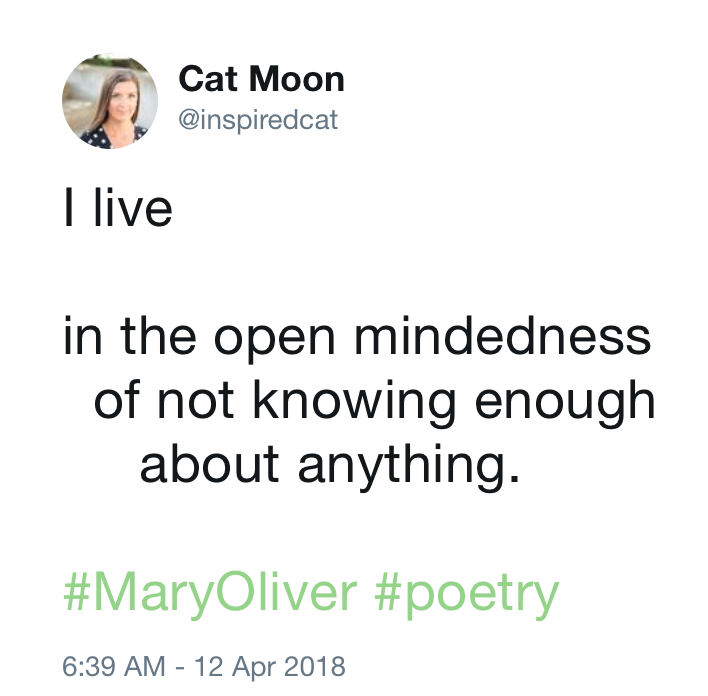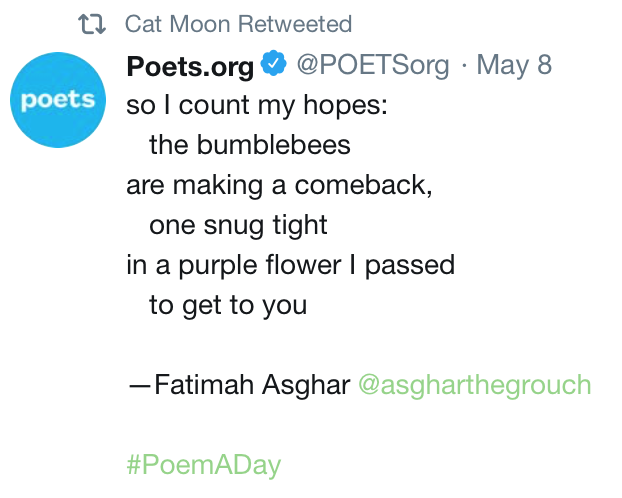
Vanderbilt Law professor Cat Moon is an active tweeter. She uses the Twitter platform to question the legal industry and promote improved legal education. And occasionally she breaks the stream with poetry.

Cat is a particularly big fan of Mary Oliver, the Pulitzer Prize winning poet who used the natural world to observe truths about herself and humanity. Reflecting on the process of observation and writing of poets like Oliver has, Cat told me, improved her own writing.
As part of the Insights interview series, I asked Cat about her poetry habit and how it has helped develop her writing craft.
Poetry is all about creating a very rich experience with an economy of words. It demands that you are very efficient. You both construct structure and choose words to convey as much meaning and emotion in as tight a space as possible. It’s incredibly valuable to consume writing that is constructed that way.
Cat was quick to not only credit her reading poetry for improved overall writing, but for her legal writing in particular.
I very much think it can inform how we write for our clients.
She expanded on these two principles from poetry in our interview, efficient use of language and purposeful structure.
I framed the conversation about efficient language using a common example from Shakespeare.
When he advised his son before a long journey, Shakespeare’s Polonius began by observing that “brevity is the soul of wit, and tediousness the limbs and outward flourishes.”
The old man rarely succeeded at keeping things short in Hamlet, but Cat takes inspiration from the ideal:
I believe there is nothing more beautiful than an incredibly rich and powerful message delivered as tightly and as efficiently as possible.
The power of efficiency may be different and more important than brevity. Poets have told elaborate stories, as have authors known for their economic use of words like Ernest Hemingway, but they did it by carefully choosing only the words that work.
These giants of writing knew that efficiency comes more from editing than from brilliance. As Mary Oliver put it, “Poetry, to be understood, must be clear… I always feel that whatever isn’t necessary shouldn’t be in the poem.”
(Hemingway put it more colorfully, telling his friend F. Scott Fitzgerald that, “I write one page of masterpiece to ninety-one pages of shit. I try to put the shit in the wastebasket.”)
The kind of efficient language that Cat encouraged is the result of ruthless editing. Be brave enough to use five words, rather than assume that fifty will do.
Cat also reiterated the value of structure in legal writing. She again looks to poetry for inspiration:
When we are writing – whether it’s to persuade a court or to convey information to a client – we have a purpose for our writing. We must approach it intentionally and ask, How can I structure this content to have the most powerful impact possible?

Legal writing, as we’ve discussed throughout this Insights series, comes with certain conventions and expectations. Inasmuch as those conventions serve the purposes Cat mentioned, they should be included; when they do not, you should ruthlessly cut them.
Begin that ruthless cutting with a clear outline. Put the purpose of your writing up front, not toward the end. Use the bulk of your piece to buttress the argument rather than hide it. Your structure should tell a story, designed to potentially move the reader from one position to another.
Poets accomplish this journey through the conventions of their craft. That usually means following the conventions, and occasionally breaking them. But those choices always further their emotional and expressive purpose. Cat believes that we can learn from that purpose-first organization.
Often reading a very beautiful poem can reveal the power of structure that I think people should be more open to.
Poets use both efficiency and structure to give their writing force. If you want to improve your craft, look out for these two tools of great poets.
Ultimately, if you want to be a better legal writer you must take inspiration from wherever it comes. If you will do things like carry a notebook and take down your moments of clarity, you will become a better writer.
There is no way to improve without developing that presence of mind. As Mary Oliver put it, “To pay attention, this is our endless and proper work.”
To see the entire interview with Cat, check out the video below…
And take a look at the other articles in this series on better writing for lawyers. We’re happy to support the development of good writing habits and would love a chance to explain how you can incorporate Casetext’s AI-enabled research tools to enhance your skills.
Please take a moment to schedule a demo of Casetext’s research tools, and take advantage of our free trial. As you’ll see, we aim to help good lawyers like you improve their craft.
Rapidly draft common legal letters and emails.
How this skill works
Specify the recipient, topic, and tone of the correspondence you want.
CoCounsel will produce a draft.
Chat back and forth with CoCounsel to edit the draft.
Get answers to your research questions, with explanations and supporting sources.
How this skill works
Enter a question or issue, along with relevant facts such as jurisdiction, area of law, etc.
CoCounsel will retrieve relevant legal resources and provide an answer with explanation and supporting sources.
Behind the scenes, Conduct Research generates multiple queries using keyword search, terms and connectors, boolean, and Parallel Search to identify the on-point case law, statutes, and regulations, reads and analyzes the search results, and outputs a summary of its findings (i.e. an answer to the question), along with the supporting sources and applicable excerpts.
Get answers to your research questions, with explanations and supporting sources.
How this skill works
Enter a question or issue, along with relevant facts such as jurisdiction, area of law, etc.
CoCounsel will retrieve relevant legal resources and provide an answer with explanation and supporting sources.
Behind the scenes, Conduct Research generates multiple queries using keyword search, terms and connectors, boolean, and Parallel Search to identify the on-point case law, statutes, and regulations, reads and analyzes the search results, and outputs a summary of its findings (i.e. an answer to the question), along with the supporting sources and applicable excerpts.
Get a thorough deposition outline in no time, just by describing the deponent and what’s at issue.
How this skill works
Describe the deponent and what’s at issue in the case, and CoCounsel identifies multiple highly relevant topics to address in the deposition and drafts questions for each topic.
Refine topics by including specific areas of interest and get a thorough deposition outline.
Ask questions of contracts that are analyzed in a line-by-line review
How this skill works
Allows the user to upload a set of contracts and a set of questions
This skill will provide an answer to those questions for each contract, or, if the question is not relevant to the contract, provide that information as well
Upload up to 10 contracts at once
Ask up to 10 questions of each contract
Relevant results will hyperlink to identified passages in the corresponding contract
Get a list of all parts of a set of contracts that don’t comply with a set of policies.
How this skill works
Upload a set of contracts and then describe a policy or set of policies that the contracts should comply with, e.g. "contracts must contain a right to injunctive relief, not merely the right to seek injunctive relief."
CoCounsel will review your contracts and identify any contractual clauses relevant to the policy or policies you specified.
If there is any conflict between a contractual clause and a policy you described, CoCounsel will recommend a revised clause that complies with the relevant policy. It will also identify the risks presented by a clause that does not conform to the policy you described.
Get an overview of any document in straightforward, everyday language.
How this skill works
Upload a document–e.g. a legal memorandum, judicial opinion, or contract.
CoCounsel will summarize the document using everyday terminology.
Find all instances of relevant information in a database of documents.
How this skill works
Select a database and describe what you're looking for in detail, such as templates and precedents to use as a starting point for drafting documents, or specific clauses and provisions you'd like to include in new documents you're working on.
CoCounsel identifies and delivers every instance of what you're searching for, citing sources in the database for each instance.
Behind the scenes, CoCounsel generates multiple queries using keyword search, terms and connectors, boolean, and Parallel Search to identifiy the on-point passages from every document in the database, reads and analyzes the search results, and outputs a summary of its findings (i.e. an answer to the question), citing applicable excerpts in specific documents.
Get a list of all parts of a set of contracts that don’t comply with a set of policies.
Ask questions of contracts that are analyzed in a line-by-line review
Get a thorough deposition outline by describing the deponent and what’s at issue.
Get answers to your research questions, with explanations and supporting sources.